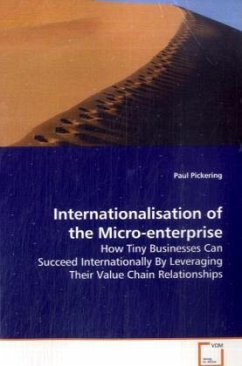It seems common wisdom that in order for a business
to succeed internationally it should first have
reached a certain size, resource base, and a high
level of domestic market intensity. However, this
book provides in-depth acounts of seven innovative
micro-enterprises that chose to bypass these steps,
attaining remarkable overseas success despite severe
knowledge and resource constraints.
It demonstrates to managers how the most diminutive
of enterprise forms can penetrate the foreign market
through nurturing and leveraging key relationships in
their value chain. More importantly, the detailed
longitudinal retrospections of each micro-enterprise
reveal that those adopting a social exchange (trust
based) instead of a transaction cost (contracts
based) approach to relationship development attain
better international outcomes overall.
It should also serve to remind policy makers and
public funding agencies alike of how worthy of
support some micro-enterprises are. In fact, given
that they make up around 90% of businesses in most
industrialised economies, their importance to
economic development should not be overlooked.
to succeed internationally it should first have
reached a certain size, resource base, and a high
level of domestic market intensity. However, this
book provides in-depth acounts of seven innovative
micro-enterprises that chose to bypass these steps,
attaining remarkable overseas success despite severe
knowledge and resource constraints.
It demonstrates to managers how the most diminutive
of enterprise forms can penetrate the foreign market
through nurturing and leveraging key relationships in
their value chain. More importantly, the detailed
longitudinal retrospections of each micro-enterprise
reveal that those adopting a social exchange (trust
based) instead of a transaction cost (contracts
based) approach to relationship development attain
better international outcomes overall.
It should also serve to remind policy makers and
public funding agencies alike of how worthy of
support some micro-enterprises are. In fact, given
that they make up around 90% of businesses in most
industrialised economies, their importance to
economic development should not be overlooked.








